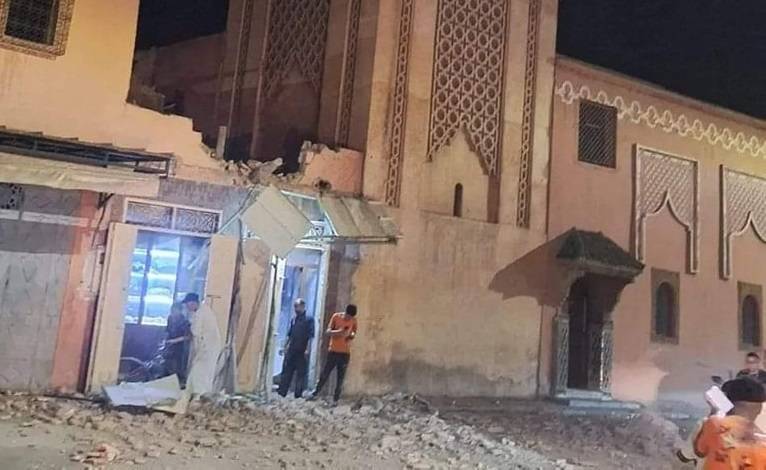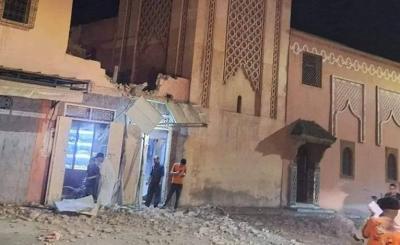A powerful earthquake struck the High Atlas Mountains region of Morocco late Friday, resulting in at least 1,037 deaths and 1,204 injuries, along with massive destruction, causing residents of major cities to flee their homes in panic. As daylight reveals the extent of the damage, the situation is expected to be catastrophic in the mountainous villages that are hard to access due to rough roads, especially since the area affected by the earthquake in the Ighil province is a tourist destination and there are dozens of missing persons. The Interior Ministry reported that this number represents the initial toll of the dead. A local official stated that most of the fatalities occurred in mountainous regions that are difficult to reach.
Residents in Marrakech, the nearest major city to the earthquake’s epicenter, reported that some buildings in the old city, which is a UNESCO Heritage site, collapsed. Local television showed images of a mosque minaret falling and debris scattered on smashed cars. A reporter noted the collapse of the mosque's minaret in the Jemaa el-Fnaa Mosque in Marrakech, as well as parts of some walls.
According to the Al-Arabiya channel, citing local sources, five members of one family died due to the earthquake. Montasir Ittri, a resident of the nearby Asni mountain village, said that most homes there were damaged. He added, "Our neighbors are under the rubble and locals are working hard to save them using available means in the village." To the west, near Taroudant, teacher Hamid Afkar stated he fled his home and that aftershocks followed the main earthquake. He mentioned, "The ground shook for about 20 seconds. The doors opened and closed by themselves as I descended from the second floor to the ground floor."
The Moroccan National Institute of Geophysics reported that the earthquake occurred in the Ighil area of the High Atlas Mountains with a magnitude of 7.2. The U.S. Geological Survey estimated the quake as approximately 6.8, occurring at a depth of 18.5 kilometers. The mountainous Ighil region, which includes small agricultural villages, is about 70 kilometers southwest of Marrakech. The earthquake struck after 11 PM local time (2200 GMT).
In Marrakech, some homes in the crowded old city collapsed, and residents are working tirelessly to lift the debris while waiting for heavy equipment to arrive, according to a local. Footage showed large cracks on a section of the medieval city wall and fallen parts scattered in the streets. Ibrahim Hemi, a resident of Marrakech, reported seeing ambulances exiting the old town, with many building facades damaged. He added that fear dominated many people who remained outside in case of another quake.
Huda Hafsi (43) in Marrakech stated, "The chandelier fell from the ceiling, forcing me to flee into the street. I am still on the road with my children and we are scared." Another woman named Dalila Fahim mentioned that her house has cracks and her furniture was damaged. She said, "Fortunately, I had not yet fallen asleep and felt the tremor. I fled when household items began to fall." Witnesses reported to Reuters that people in Rabat, about 350 kilometers north of Ighil, and in the coastal town of Imessouane, located about 180 kilometers to the west, also fled their homes in fear of a stronger earthquake.
A responsible official from the Moroccan National Institute of Geophysics confirmed that the aftershocks following the earthquake that struck Morocco on Friday night are of lower intensity and may not be felt by residents. Nasser Jabour, a department head at the institute, explained to the Moroccan News Agency that the earthquake, with a magnitude of 7 on the Richter scale and centered 80 kilometers southwest of Marrakech, was felt by people in many Moroccan cities within a radius of 400 kilometers.
**International Responses:**
- **UAE:** The President of the UAE, Sheikh Mohammed bin Zayed Al Nahyan, directed the establishment of an airbridge to deliver urgent aid to those affected by the earthquake in Morocco, reflecting the strong brotherly ties between the UAE and Morocco and emphasizing the Emirati approach to solidarity during difficult times.
- **Jordan:** The Jordanian Royal Court announced that King Abdullah II expressed condolences to King Mohammed VI of Morocco and directed the provision of necessary assistance.
- **Algeria:** Algeria announced it would open its airspace for humanitarian and medical flights to transport aid and the injured to Morocco after the powerful earthquake. The Algerian presidency expressed readiness to provide humanitarian aid and all its resources should Morocco request assistance.
- **UK:** British Foreign Secretary James Cleverly stated his readiness to support Moroccan friends in any way possible.
- **France:** French President Emmanuel Macron expressed shock at the devastating earthquake in Morocco, stating that France is prepared to provide assistance.
In a related context, the Paris City Council announced that the lights of the Eiffel Tower would be turned off at 11 PM (2100 GMT) in solidarity with the earthquake victims in Morocco.




